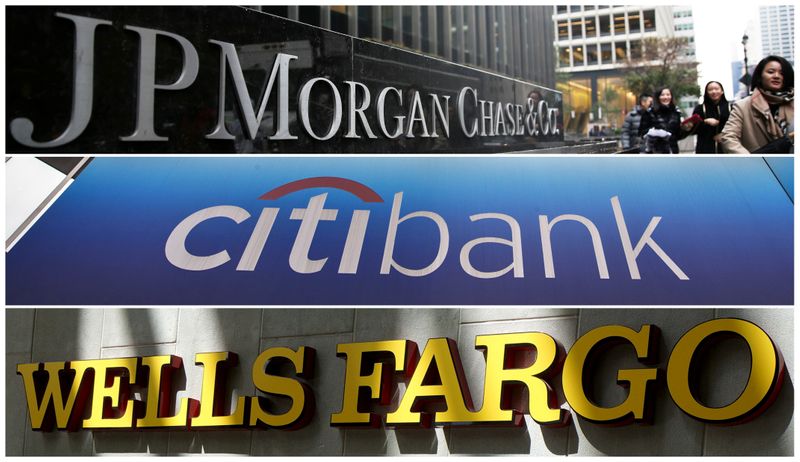By Michelle Price
WASHINGTON (Reuters) - The four largest U.S. consumer banks posted another strong quarter this week as the rebounding economy allowed them to release more cash they had set aside for pandemic losses, while sizzling deals, equity financing and trading also boosted their bottom lines.
JPMorgan Chase & Co (NYSE:JPM), Citigroup (NYSE:C), Well Fargo & Co and Bank of America Corp (NYSE:BAC), seen by analysts and economists as bellwethers of the broader economy, reported a combined profit of $28.7 billion for the third quarter, beating analyst estimates.
Much of that was driven by the release of a combined $6 billion of funds the banks had put aside for pandemic loan losses which have not materialized thanks to extraordinary government stimulus, aid programs and loan repayment holidays.
With the national vaccination roll-out allowing Americans to get back to work and resume socializing after 19 months of pandemic-related business closures and travel restrictions, consumer spending has boomed, the banks said.
Loan growth, a key metric closely-watched by analysts, was mixed across Wall Street however. Some lenders are still struggling to grow their loan books as consumers and businesses, flush with cash from government aid programs, continue to pay down loans.
Overall, though, executives were cautiously optimistic that the economy is on a healthy trajectory, despite some risks on the horizon including the latest wave of COVID-19 infections and inflation worries.
"The outlook for the economy is promising," Wells Fargo (NYSE:WFC) Chief Executive Charles Scharf told analysts on Thursday.
"Consumers' financial condition remains strong with leverage at its lowest level in 45 years and the debt burden below its long-term average. Companies are also strong as well."
The bank's customers have cash and are looking to spend he added, noting consumer customers' median deposit balances remained above pre-pandemic levels.
JPMorgan said combined debit and credit card spend was up 26% year-on-year, while card payment rates stabilized contributing to modest card loan growth. At Bank of America, combined credit and debit card spend was up 21%.
Spending on Citi-branded credit cards in the United States jumped 24% from a year earlier, but with so many customers paying off balances net interest revenue from credit card accounts fell 3%. In a sign that the trend may be turning, net interest revenue on the cards was up 5% from the second quarter.
"On balance, the earnings across the board are really solid," said Patrick Kaser, portfolio manager at Brandywine Global Investment Management.
"We're seeing signs of inflection in loan growth (and) optimism about continued economic strength, re-affirmation of the strength of the consumer."
'ON FIRE'
Sizzling capital markets over the past six months have also buoyed the country's largest lenders, with easy monetary conditions driving record-breaking volumes of both mergers and acquisitions (M&A) and initial public offerings, fueling fees.
That helped cushion a decline in fixed income trading this year, which was turbo-charged last year by intense market volatility.
Investment banking giant Morgan Stanley (NYSE:MS) Inc crushed estimates on Thursday, reporting a $3.58 billion profit, up nearly 38% on the year-ago-quarter. That was thanks in large part to a record $1.27 billion in revenues from advising from advising on deals.
"The investment bank, itself, and M&A, is on fire," James Gorman, the bank's chief executive, said in an interview with CNBC after the results. "We've got global GDP growth, enormous fiscal stimulus, record low interest rates. People want to transact."
The highlight for JPMorgan's third quarter was also its Corporate & Investment Bank division, where advisory fees almost tripled due to strong M&A and equity underwriting. All told, that division reported a 6% rise in net revenue.
At Bank of America, revenue from its equities division rose 33% year-on-year, driven by growth in client financing activities and strong trading performance, while Citigroup said revenues for its equity markets business had jumped 40%.
Goldman Sachs (NYSE:GS), Wall Street's most prolific dealmaker, will wrap up bank earnings season on Friday.
While capital markets shone, loan growth remained mixed.
JPMorgan said on Wednesday that loans were up 5% across the bank compared with last year, while Citi was broadly flat. Bank of America and Wells Fargo reported declines in loan growth year-on-year.

However, lending appeared to be trending in the right direction at Bank of America, with loan balances up $21 billion compared with the second quarter of this year.
"We're still seeing people paying off their bills and revolving less," said Kaser. "So the lack of loan growth is easily explainable."